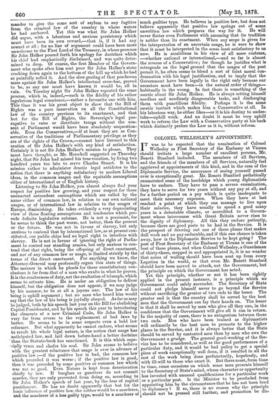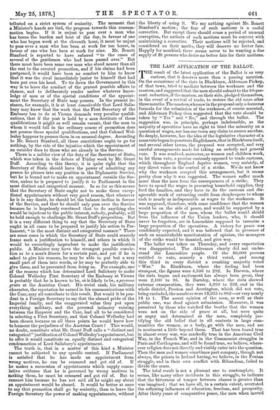COLONEL WELLESLEY'S APPOINTMENT.
IT was to be expected that the nomination of Colonel Wellesley as First Secretary of the Embassy at Vienna should irritate a large number of excellent persons, Mr. Benett Stanford included. The members of all Services, and the friends of the members of all Services, naturally feel aggrieved at appointments of this kind, and in the case of the Diplomatic Service, the annoyance of seeing yourself passed over is exceptionally great. Mr. Benett Stanford pathetically enumerated some of the hardships which young diplomatists have to endure. They have to pass a severe - examination, they have to serve for two years without any pay at all, and for a further period on a pay which is quite inadequate to meet their necessary expenses. When they have at last reached a point at which they can manage to live upon their salaries, they have usually to spend a good many years in a detestable climate, or accredited to a Govern- ment whose intercourse with Great Britain never rises to the dignity of diplomacy. All this they endure patiently, because there are good posts to be had in the Service. It is the prospect of drawing out one of these plums that makes dull work and no pay endurable, and if this one chance is taken away, how is the Diplomatic Service to be kept going ? The post of First Secretary of the Embassy at Vienna is one of the best of these plums, and when Colonel Wellesley, a Guardsman of thirty-three, stepped in and appropriated it, it is no wonder that notes of wailing should have been sent up from every Legation in the world, or that even Mr. Benett Stanford should have been moved to attack, not the Government, but the principle on which the Government has acted.
Yet this principle, whether or not it has been rightly applied in the present instance, is a principle which no Government could safely surrender. The Secretary of State could not pledge himself never to go beyond the Service without sacrificing the greater of two ends to the lesser. The greater end is that the country shall be served by the best men that the Government can lay their hands on. The lesser is that it shall be served by men who give all they can, in the confidence that the Government will give all it can in return. In the majority of cases, there is no antagonism between these two ends. Men who have been trained as diplomatists will ordinarily be the best men to promote to the higher places in the Service, and it is always better that the State should be served by contented men than by men who owe the Government a grudge. The general good-working of the Ser- vice has to be considered, as well as the good performance of a particular duty, and it would be bad policy to get a special piece of work exceptionally well done, if it resulted in all the rest of the work being done perfunctorily, hopelessly, and with to those who exact it. But there must, from time to time, come occasions on which some man presents himself to the Secretary of State's mind, whom character or opportunity has invested with unusual qualifications for a particular work or a particular post. Is the Minister to be precluded from appointing him by the circumstance that he has not been bred to diplomacy ? If so, there is no reason why the principle should not be pressed still further, and promotion be dis- tributed on a strict system of seniority. The moment that a Minister's hands are tied, the progress towards this consum- ination begins. If it is unjust to pass over a man who has borne the burden and heat of the day, in favour of one who has begun work at the eleventh hour, it must be unjust to pass over a man who has been at work for ten hours, in favour of one who has been at work for nine. Mr. Benett Stanford is reported to have referred " to the cases of several of the gentlemen who had been passed over." But there must have been some one man who stood nearer than all the rest to the coveted promotion, and if his claims had been postponed, it would have been no comfort to him to know that it was the rival immediately junior to himself that had been put over his head. To tie down the Government in this way is to leave the conduct of the gravest possible affairs to chance, and to deliberately render useless whatever know- ledge of men or of the special conditions of the appoint- ment the Secretary of State may possess. In the present in- stance, for example, it is at least conceivable that Lord Salis- bury may know that the work that the First Secretary of the Embassy has to do at Vienna demands very peculiar qualifi- cations, that if the post is held by a man destitute of these qualifications it might as well remain vacant, that the man to whom it would fall in the ordinary course of promotion does not possess these special qualifications, and that Colonel Wel- lesley happens to possess them in an unusual degree. According to Mr. Benett Stanford, all these convictions ought to go for nothing, by the side of the injustice which the appointment of an outsider does to those who are already in the Service.
There is a milder view of the duty of the Secretary of State, which was taken in the debate of Friday week by Mr. Grant Duff. According to this theory, it is quite right that the Secretary of State should have the power of admitting any person he pleases into any position in the Diplomatic Service, but he is bound not to make an appointment outside the Ser- vice, unless he is prepared to justify it to Parliament in the most distinct and categorical manner. In so far as this means that the Secretary of State ought not to make these excep- tional appointments without very good reason, that whenever he is in any doubt, he should let the balance incline in favour of the Service, and that he should only pass over the Service because he is hopelessly convinced that to do anything else would be injurious to the public interest, nobody, probably, will be bold enough to challenge Mr. Grant Duff's proposition. But it is a very different thing to say that the Secretary of State ought in all cases to be prepared to justify his action to Par- liament, " in the most distinct and categorical manner." There are some cases in which the Secretary of State could scarcely frame such a justification to himself, and others in which it would be exceedingly imprudent to make the justification public. A Minister may have the strongest possible convic- tion as to a man's fitness for a certain post, and yet if he is asked to give his reasons, he may be able to put but a very small part of them into words, or he may be perfectly able to give them, and be prevented from doing so. For example, one of the reasons which has determined Lord Salisbury to make Colonel Wellesley First Secretary of the Embassy at Vienna is probably that he is known to be, or is likely to be, apersona grata at the Austrian Court. His social rank, his military character, the reputation he earned in his communications with the Czar, may all contribute to this result. But would it be pru- dent in a Foreign Secretary to say that the absurd pride of the Imperial family, and the exaggerated value they put upon everything military, and the personal intimacy existing between the Emperor and the Czar, had all to be considered in selecting a First Secretary, and that Colonel Wellesley had been chosen because on all these points he would know how to humour the prejudices of the Austrian Court ? This would, no doubt, constitute what Mr. Grant Duff calls a " distinct and categorical" justification of Colonel Wellesley's appointment, but to offer it would constitute an equally distinct and categorical condemnation of Lord Salisbury's appointment.
The truth is, that in a matter of this kind a Minister cannot be subjected to any specific control. If Parliament is satisfied that he has made an appointment from wrong motives, he can be censured and got rid of. If he makes a succession of appointments which supply cumu- lative evidence that he is governed by wrong motives in making them, he must be censured and got rid of. But to censure him because he has not said all he might say about an appointment would be absurd. It would be better at once to say that promotion shall go by seniority, than to leave the Foreign Secretary the power of making appointments, without the liberty of using it. We say nothing against Mr. Benett Stanford's motion ; the fear of such motions is a useful corrective. But except there should come a period of unusual corruption, the authors of such motions must be content with maintaining a corrective. Their motions will be rejected, and considered on their merits, they will deserve no better fate. Happily for mankind, there seems never to be wanting a due supply of fit persons who desire no better fate for their motions.



































 Previous page
Previous page